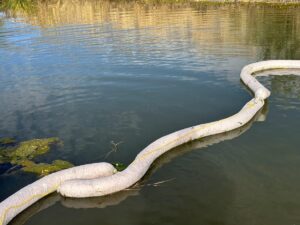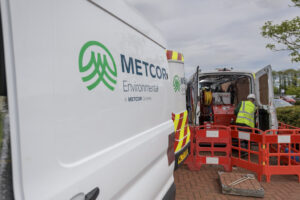Industrial & Logistics
Major oil contamination

Solving a critical multi-stakeholder problem averts environmental disaster and keeps industrial estate operating:
A 42 acre industrial estate, located in Eastleigh has an environmentally important river running by it. The site is managed by a leading international property management firm and houses major distribution facilities, transport depots and light industrial units.
The Background
The River Itchen is a chalk stream which flows for approximately 28 miles from mid-Hampshire to Southampton. The river has international importance and is designated a Site of Specific Scientific Interest (SSSI) due to its high quality habitats that support a range of protected species.
The Problem
- After major oil contamination issues impacting the River Itchen, the Environment Agency was threatening to shut down the site entirely.
- The site was in breach of the Water Authority Act 1991 and on the EA’s ‘Red List’.
Appointment of Metcor Environmental
- To avoid the site’s drainage outflows being shut off by Southern Water / the EA, Metcor Environmental was appointed as specialist representative by the managing agents.
- We led a meeting with EA and Southern Water officials, representatives from each of the 20 tenants and the Facilities Manager, to agree an action plan that involved two phases
- We then held stakeholder meetings each week of Phase One
The solution: Phase One

Oil absorbent booms
- Installation of specialised booms by the river outfall
- Oil-absorbent booms fitted across surface water system, with levels monitored over 4 week period
- Dye testing at each tenant’s premises
- Using our jet-vac tanker capacity to remove all petrol interceptor waste across site
- Lab tests of hazardous oil waste samples
- This 4-week program reduced contamination and removed the industrial park off the EA ‘Red List’
Findings from the investigations
- Following the success of Phase 1, we pinpointed the contamination to a bus depot
- Their vehicle washing system linked via a petrol interceptor into the surface water system
- We carried out a full-entry investigation of the petrol interceptor and found it had been installed back-to-front
- We also discovered a catchment pit beneath the depot that directed oil-contaminated waste directly into the surface-water drainage

Metcor Van
The solution: Phase Two
- Working with all parties, we designed a correctly-sized and located system
- We conducted a ‘flows and loads’ survey to gauge drainage system capacity utilisation
- We launched a 12 week program of civil excavations to upgrade the drainage infrastructure and install the correct interceptor systems
- We worked with the tenant’s approved contractors while continuing Phase 1 monitoring
- Our tanker fleet provided haz-waste removal support
Follow up
- Following completion of the project, we re-surveyed the site to provide up-to-date drainage plans
- We introduced our robust annual maintenance program to clean foul and surface water systems
- Six months after the project, a detailed follow-up investigation revealed no contamination in the water course
Quantifying the success
- Avoided over £500,000 lost revenues for tenants
- Over £150,000 Environment Agency fines prevented
- £8,400 Cost of annual surface and foul-water PPM, and ongoing monitoring
- £340 average annual reactive spend across entire 42-acre site since Metcor Environmental works
- Zero – number of Environment Agency issues since Metcor Environmental works
Share on


